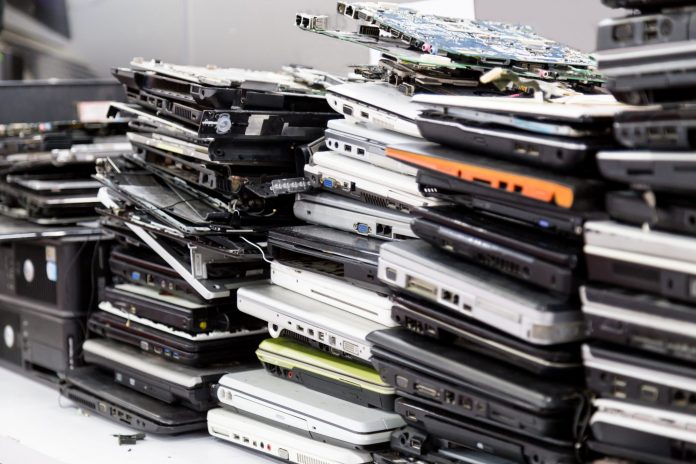AUBURN UNIVERSITY, Ala. – Broken or discarded household and industry electronics used for telecommunications, data processing or entertainment are known as electronic waste (e-waste). Chemicals found in e-waste are toxic and can seep into the soil at public landfills. Recycling, however, reduces e-waste contamination. Today, e-waste recycling protects natural resources and is easy and widely available.
Why recycle e-waste?
Recycling e-waste helps to reduce pollution and to repurpose electronic materials for future use. With increasing reliance on digital media, there is a concurrent increase in e-waste. In 2019, the United States generated approximately 7.6 million tons of e-waste according to The Global E-Waste Statistics Partnership. Since only 15 percent of e-waste is collected, there is a need to increase the frequency and intensity of e-waste recycling events. When the public chooses to recycle, these products are collected, processed and prepped to sell to various markets. Therefore, recycling electronics not only prevents environmental degradation and reduces waste, it helps to create local job opportunities.
2021 Recycling Drives
Alabama Extension at Alabama A&M University has a long history of hosting e-waste recycling events. The urban forestry, wildlife and natural resources management team partnered with local organizations to hold several recycling drives across the state from March through May 2021.
March
In early March, Tyler Mason, an urban regional Extension agent, co-hosted a recycling event at the Birmingham Zoo in partnership with the Jefferson County Commission. This event included both e-waste and paper shredding components for residents in Jefferson and surrounding counties.
Also in March, Urban Regional Extension Agent Mary Dixon facilitated an e-waste recycling event in Mobile. This activity was held in partnership with Keep Mobile Beautiful, Ransom Recycling and the Mobile Area Water and Sewage System. Residents from Mobile and Baldwin counties dropped off recyclables at the Mobile County Extension Office. In return, they received a goody bag with a grease recycling container, a litter bag, informational flyers and several other giveaways.
April
In mid-April, Allyson Shabel, an urban regional Extension agent, and Karnita Garner, an Extension environmental specialist, partnered with the City of Huntsville’s Operation Green Team to host an e-waste drive and a hazardous waste collection day. This event was held at Hays Nature Preserve in Huntsville. As an Earth Day activity, visitors collected “go green” bags with wildflower seeds, herb seeds and other information. Participants also took home a Deterra drug disposal pouch to safely dispose of unused and unwanted medication.
May
In May, Shabel co-hosted a recycling event in Decatur in partnership with the Better Business Bureau of North Alabama. Participants from across Morgan County were able to recycle e-waste and safely dispose of unused medication. This event also offered paper shredding as a means to securely dispose of important documents. Garner, AAMU Agribition Center Manager Robert Spencer, and Urban Regional Extension Agent Marcus Garner assisted with the event.
By following the CDC’s COVID-19 guidelines, participants avoided public contact. They did not have to leave the comfort of their vehicles to properly discard materials and produce significant impacts.
Recycling Impacts
Recycling events yield significant social, environmental and economic impacts. For example, chemicals found in electronics, such as mercury, lead, cadmium, bromine and chromium, are toxic and harmful to animals, plants and humans. Alabama Extension at AAMU and local partners host recycling events throughout the year. By working with recyclers, materials such as gold and copper, as well as old equipment, are reclaimed and repurposed.
Recycling events held during the first quarter of 2021 provided the following impacts:
- 1,293 participants
- 28,197 pounds of electronics
- 9,522 pounds of metals
- 1,250 pounds of pesticides and fertilizers
- 3,235 pounds of other chemicals
- 5 pounds of pharmaceuticals and personal care products
By recycling the metal and electronics alone from these activities, 362 gallons of oil and 1,179,289 hours of electricity were saved according to the Montgomery County Department of Environmental Protection. Additionally, more than 39,303 pounds of carbon emissions were reduced, and 810 pounds of toxic metals were diverted away from the environment based on the e-Stewards Global Impact Calculator.
E-waste and other environmental drives are a great way to properly dispose of materials that are harmful to the environment. It also makes recycling easier for people who desire to protect the environment.
Learn More
Through the International Cooperation Program, the Environmental Protection Agency (EPA) works to reduce the negative impact of e-waste in the United States and developing nations.
In Alabama, residents are encouraged to contact the Alabama Extension urban forestry, wildlife, and natural resources professional serving their county to learn about e-waste best management practices. These professionals will be able to help locate an e-waste recycler and find upcoming e-waste drives. Also, Alabama Extension’s EMEP: E-waste Management Education Program offers educational information on recycling e-waste safely and improving environmental stability.



























